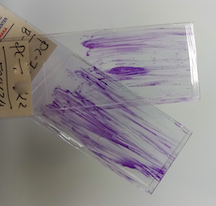Diagnostics: Bethesda classification system for assessing cancer risk of a thyroid nodule by fine needle biopsy
What is The Bethesda system?
Needle biopsy is undertaken, usually with ultrasound guidance.
The biopsy specimen is smeared on a glass slide.
The Bethesda classification system is a standardized system used to categorize the results of fine needle aspiration (FNA) biopsies of the thyroid gland. Developed initially in 2007 during a conference at the National Cancer Institute in Bethesda, Maryland, it estimates risk of a thyroid nodule being malignant and is used to make treatment recommendations.
The most recently updated Bethesda system (2023) categorizes thyroid FNA results into six diagnostic categories:
Category 1: Non-diagnostic/Unsatisfactory: Samples in this category are inadequate for evaluation and may require repeat FNA or decision making based on other available information. A Bethesda category 1 (Non-diagnostic) score does not indicate the likelihood of cancer—it only indicates that no information is available from the fine needle biopsy.
Category 2: Benign: Specimens meeting criteria for this category demonstrate normal thyroid cells. A repeat thyroid ultrasound is usually undertaken after a period of time for these nodules to ensure no significant growth or concerning change occurs.
Category 3: Atypia of Undetermined Significance (AUS): Samples in this category show some abnormal cells, but it is unclear whether these indicate a benign or malignant process. Further evaluation or repeat FNA may be recommended.
Category 4: Follicular Neoplasm / Suspicious for Follicular Neoplasm: This category indicates the presence of follicular cells that may suggest a neoplasm, which could either be benign or malignant. Surgical evaluation is usually warranted for a definitive diagnosis, but molecular testing or observation before deciding on surgical management may be used carefully in some cases.
Category 5: Suspicious for Malignancy: This classification suggests a significant concern for thyroid cancer, though it is not definitive. Patients typically undergo surgical intervention for further assessment.
Category 6: Malignant: This category is reserved for samples that clearly exhibit cancerous cells. Immediate management typically includes surgical treatment.
The Bethesda classification system enhances the management of thyroid nodules by providing a framework for assessing the likelihood of cancer and guiding clinical decision-making. It aids in stratifying the risk, which facilitates appropriate surveillance or treatment strategies for patients. Note that the Bethesda categories 3, 5, and 6 do not indicate which type of thyroid cancer is suspected or diagnosed, but the pathologist may comment on a specific type of thyroid cancer suspected in their report.
The glass slide is sent to a pathologist to examine under a microscope.
The appearance of the cells are used to diagnose the specimen. Thyroid nodules are classified according to the Bethesda system.
This is an example of a fine needle biopsy specimen consisting of only a few cells, but this small sample was adequate for the pathologist to diagnose papillary thyroid carcinoma (Bethesda Category 6).







